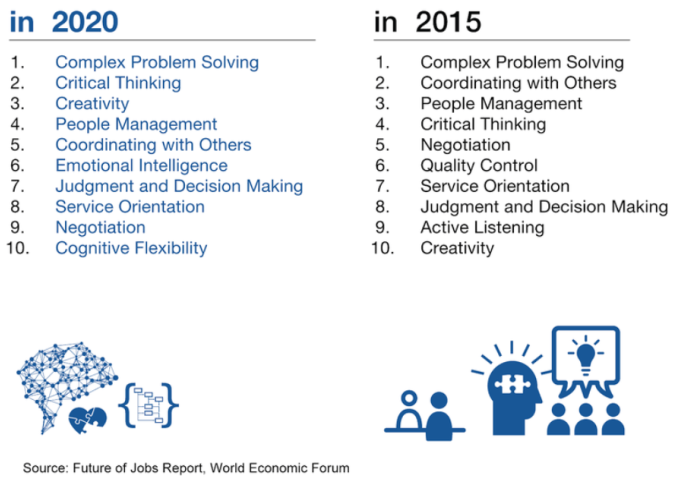Creativity is the most in-demand soft skill in 2019, according to analysis of hundreds of thousands of job postings by LinkedIn (Hess, 2019). And there are many other articles and studies which list creativity as one of the 21st century skills which graduates will need to demonstrate in order to succeed and to thrive after graduation.

Creativity is ‘no longer a luxury for the few, but…a necessity for all’ (Csikszentmihalyi 2006). The European Association of Universities report Creativity in Higher Education (2007) issued the warning that if higher education does not strengthen creativity, then ‘the very goal of a European knowledge society would be at stake.
Erica McWilliam identified that creativity in learning and teaching in higher education is an issue:
‘The challenge for universities …. is to promote and support a culture of teaching and learning that parallels an unpredictable and irregular social and commercial world in which supply and demand is neither linear nor stable, and labour is shaped by complex patterns of anticipations, time and space.’
However, creativity is much more than just an employability skill. Imagination and creativity ‘enable you to sustain yourself through the challenges and opportunities you will encounter throughout your life.’ (Kleiman et al, 2019). Using imaginative contexts and activities in learning can be stimulating and enriching for both teachers and students.
But in a higher education environment there can be a tendency to conform to established practices, to use the same approaches, sometimes those we experienced as learners in higher education, unquestioningly and without much encouragement to invent or adapt. This conservative approach could be attributed to the pressure of university metrics. Taking risks in teaching could be seen by some to run the risk of poor student evaluations of teaching (SET) and ultimately league table position or it could simply be the fear that creative learning activities take away from time to teach the packed curriculum, especially in competence-heavy professional courses.
Many academics struggle with how to be creative in their teaching. I have heard ‘I don’t have a creative bone in my body’ said on many occasions but if we are to develop this most in demand skill, then we need to give our students opportunities to develop and express their creativity in learning activities and in their assessments by modelling this ourselves. Despite the urging of many Academic Development staff to be innovative and use imagination, some staff worry whether they are ‘allowed’ to be creative or do something different in their modules and worry about student reactions.
Earlier this year a discussion to promote thinking about the role of imagination and creativity in higher education learning and teaching was started by the Creative Academic Network in collaboration with the #creativeHE community and the Centre for Imagination in Research, Culture and Education. It resulted in development of a collective The Creativity Manifesto published in April 2019 and a whole magazine issue with personal creativity manifestos.
Find out more about out Innovation in Teaching Practice workshops and book now
References:
Csikszentmihalyi, M. (2006). Foreword: Developing Creativity, in: N. Jackson, M. Oliver, M. Shaw, J.Wisdom (Eds). Developing creativity in higher education: An imaginative curriculum. (London, Routledge).